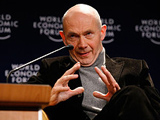WTO talks: So close, yet so far
By Eric J Lyman for ISN
The negotiations lasted nine days - longer than any previous WTO ministerial summit - and narrowly missed agreeing to terms to finally close the Doha Round of trade talks, nearly seven years after they got underway. Had the talks succeeded, international trade barriers for agriculture, industry and services would have been reduced and standardized and workers would have had more flexibility to seek jobs across international borders.
When the negotiations failed, world financial markets seemed to shrug off the news. The following day - though it is questionable whether the collapse was much of a factor - the Standard & Poor's stock market index in the US rose 1.4 percent. London's blue chip FTSE index surged 1.9 percent; Japan's Nikkei jumped 2.3 percent. The yield on 30-year US Treasury bonds barely nudged.
The indifference is not a short-term trend: During the nearly seven years since the ambitious Doha Round was launched in Qatar, international trade has grown faster than the world's GDP every year.
Despite the absence of an international trade agreement, poor countries have increasingly opened themselves to investment from wealthier counterparts, and market barriers have steadily eroded. Even the massive protests that marked previous negotiations in Seattle and Cancun have trailed off, as if the issues at stake have ceased being important to activist communities.
Clearly, these factors have not evolved specifically because Doha Round talks have, at best, stumbled forward since being launched in 2001. But they are proof that progress on commerce-related issues can come in many areas even without negotiations forcing countries into action.
But does that mean the trade talks - which will not resume until 2009 - should be scrapped so that the market can move forward on its own?
The answer is no, and for several reasons.
First, progress over the last seven years has come where it was easiest to achieve; the disagreements that helped derail the Geneva negotiations are proof that difficult issues will remain difficult. And while there are signs of markets slowly opening on their own, few would argue that speeding up the process wouldn't be an improvement.
Another important point is that the world economy is slowing, and indications suggest it will become worse before getting better. Trends have seen a rise in food and oil prices, growing security concerns and downward spiraling employment levels. These issues comprise a perfect recipe for protectionist economic policies that can sometimes stem the tide of these trends in the short term, but which, in the long term, represent a major step backward for free market advocates.
But perhaps the most compelling reason the Doha Round negotiations must continue is that they came so tantalizingly close to succeeding in Geneva.
After the collapse, WTO Director-General Pascal Lamy told journalists during a 29 July press conference that the talks had "reached convergence" on 18 of the 20 agenda items on the table.
The point of contention involved the development of a mechanism to protect the agricultural industries in countries with emerging economies from dramatic surges in imports from wealthy countries. The final discussion put the US on one side of the argument and India and China on the other. But many delegates in Geneva said the failure was a really collective one.
While it's tempting to look at the Geneva talks and rue the fact that they failed despite agreeing to most of the agenda items - far more progress than talks last year on climate change or food security, for example, were able to achieve - veteran WTO observers caution that with these types of negotiations nothing is achieved until everything is achieved.
In other words, the wide-reaching agenda points agreed to in Geneva make for compelling copy, but until the Doha Round is complete they do not make the slightest difference in any country's trade policy.
That's unfortunate. Delegates at the meeting showed a willingness to compromise that is sadly uncommon in recent multilateral fora. With the trend in world economic health headed in the wrong direction, they picked an inopportune time to fall short.
